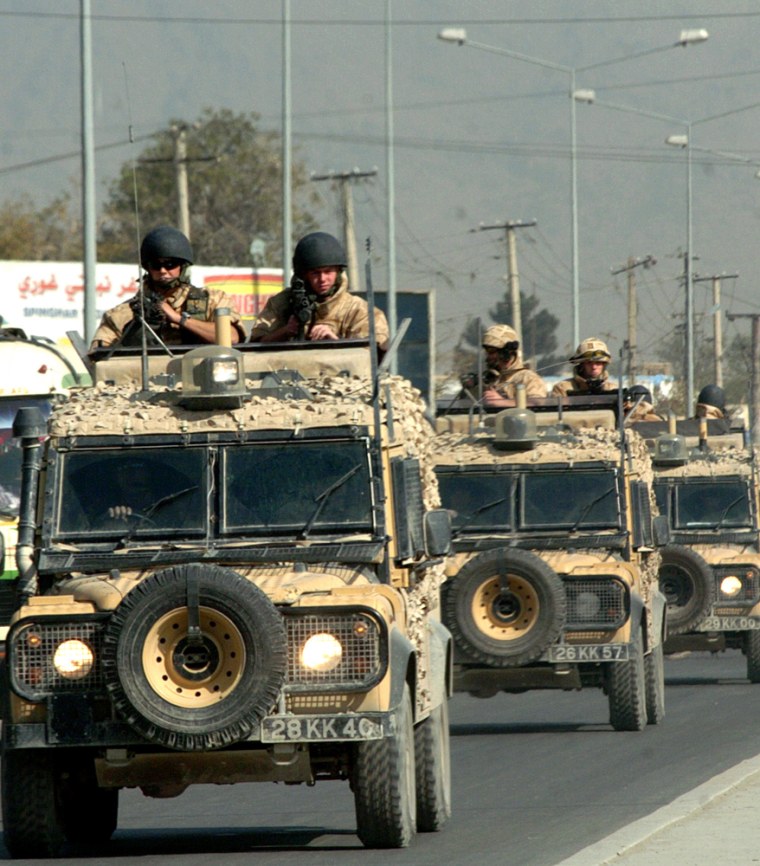NATO and Afghan troops killed 70 suspected militants who attacked a military base in southern Afghanistan, while a roadside blast killed one NATO soldier and wounded eight others, the alliance said Sunday.
Some 100 to 150 militants attacked a military base north of Tarin Kowt in Uruzgan on Saturday, said Maj. Luke Knittig, a spokesman for the NATO-led force. The alliance and Afghan troops fought back for several hours with small arms fire, attack helicopters and airstrikes.
Seventy insurgents were killed, Knittig said, upgrading an earlier estimate of 55 dead. One Afghan soldier was wounded. It was impossible to independently verify the death toll at the remote battle site.
On Sunday, a roadside blast killed one NATO soldier and wounded eight in Uruzgan, the alliance said. Three civilians were wounded. The nationalities of the slain and wounded soldiers were not disclosed.
Afghans turning against NATO
Saturday’s fighting in Uruzgan province came a day after an international human rights group criticized NATO-led troops in Afghanistan, saying their tactics increasingly endanger civilians and are turning the population against the Western alliance.
NATO’s top commander apologized Saturday for civilian deaths caused by fighting between Taliban militants and NATO forces earlier in the week, but said insurgents endanger civilians by hiding among them.
“Sadly, in asymmetric warfare, when you’re battling an insurgency, typically the insurgents do not play by the same rules that we would like to play by,” U.S. Gen. James L. Jones said.
The New York-based Human Rights Watch complained Friday that NATO’s recent operations have killed dozens of civilians, but it also criticized the Taliban and other insurgents for putting civilians at risk “by using populated areas to launch attacks on NATO and Afghan government forces.”
Jones, the NATO commander, expressed regret for civilian deaths but said Taliban fighters use civilians as human shields and said that in the heat of battle it can be difficult to separate the two.
The death of a civilian “is something that causes anybody in uniform to lose a lot of sleep,” Jones said at a news conference at Bagram, the largest U.S. base in Afghanistan.
His comments came four days after clashes between NATO-led troops and insurgents in the south that Afghan officials say killed 30 to 80 civilians, including women and children. NATO said its initial investigation found 12 civilians killed.
The 32,000-strong NATO-led force took command of security operations in Afghanistan last month. The alliance has been battling resurgent Taliban militants in the south and east in the worst upsurge of violence since the 2001 U.S.-led invasion ousted the Taliban.
Report: Taliban rule out talks
A purported statement by the Taliban leadership, meanwhile, said the hardline militia has ruled out talks with President Hamid Karzai’s government as long as foreign troops remain in the country.
The statement, e-mailed to The Associated Press by purported militia spokesman Muhammad Hanif, dismissed Karzai’s offer for talks Friday and called his administration a “puppet government.” Hanif’s exact ties to Taliban leaders are unclear, and it was not possible to verify the statement’s authenticity.
On Friday, Karzai reiterated to reporters that he was ready to negotiate with Mullah Omar if the fugitive stops receiving support from neighboring Pakistan. Karzai says Omar is hiding in the Pakistani city of Quetta, while Pakistan says he is in Afghanistan.
Over the past two years, hundreds of Taliban supporters, including some senior officials, have reconciled with Karzai’s government, but there is no indication that high-level talks with the rebel leadership have occurred.
